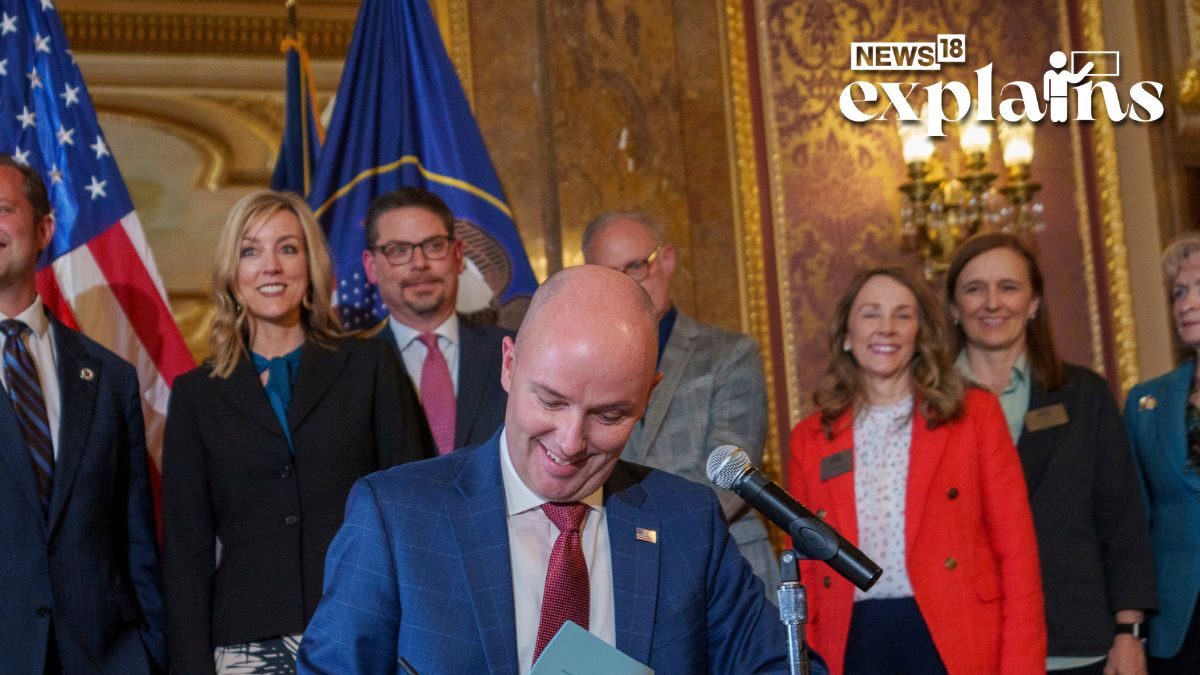
Gov. Spencer Cox signs two social media regulation bills during a ceremony at the Capitol building in Salt Lake City on Thursday, March 23, 2023. (Trent Nelson/The Salt Lake Tribune via AP)
Explained: The Utah law, which takes effect March 2024, was brought in response to fears over growing youth addiction to social media
Utah recently became the first US state to require social media sites to get parental consent for accounts used by under-18s, placing the burden on platforms like Instagram and TikTok to verify the age of their users.
The law, which takes effect March 2024, was brought in response to fears over growing youth addiction to social media, and to security risks such as online bullying, exploitation, and collection of children’s personal data.
But it has prompted warnings from tech firms and civil liberties groups that it could curtail access to online resources for marginalized teens, and have far-reaching implications for free speech.
Let’s take a look at the contentious bill, what it offers, and the wider debate:
What Do the Laws Say?
- Both laws, known as the Social Media Regulation Act, are due to go into force on March 1, 2024. The first law, SB 152, mandates social media firms to verify the age of any Utah resident who has an account on their platform. Individuals under the age of 18 will need their parent or guardian’s permission to sign up for an account and access it at all between the hours of 10:30 p.m. and 6:30 a.m., and social media companies will be prohibited from advertising to or collecting data on minors. The second bill, HB 311, requires social media companies to ensure that their platforms are not intended to cause minors to become addicted to them, and it gives Utah minors the right to sue social media companies if they believe they have become addicted to or otherwise harmed by a social media platform on which they have an account, explains a report by Vox.
- Put simply, Apart from the age verification, the bills also require social media firms to grant parents full access to their children’s accounts, and to create a default “curfew” blocking overnight access to children’s accounts.
- They set out fines for social media companies if they target users under 18 with “addictive algorithms,” and make it easier for parents to sue social media companies for financial, physical or emotional harm.
Coming to Other US States?
“We’re no longer willing to let social media companies continue to harm the mental health of our youth,” tweeted Spencer Cox, governor of the western US state, who signed two related bills at a ceremony Thursday.
“We hope that this is just the first step in many bills that we’ll see across the nation, and hopefully taken on by the federal government,” said state representative Jordan Teuscher, who co-sponsored the bill. Michael McKell, a Republican member of Utah’s Senate who also sponsored the bill, said it was a “bipartisan” effort, and praised President Joe Biden’s recent State of the Union address, in which he raised the issue.
Fun interview this morning with Chuck Todd. You can watch the entire interview in about 15 minutes here in Utah on KSL. https://t.co/n7N5UrQPmy— Spencer Cox (@SpencerJCox) March 26, 2023
Biden last month called on US lawmakers to restrict how social media companies advertise to children and collect their data, as he accused Big Tech of conducting a “for profit” experiment on the nation’s youth.
California has already introduced online safety laws including strict default privacy settings for minors, but the Utah law goes further.
Lawmakers in states such as Ohio and Connecticut are working on similar bills.
Platforms including Instagram and TikTok have introduced more controls for parents, such as messaging limits and time caps. At Thursday’s ceremony in Utah, McKell pointed to data from the federal Centers for Disease Control and Prevention which he said highlighted the toll social media apps can have on young minds.
“The impact on our daughters — and I have two daughters — it was incredibly troubling,” he said. “Thirty percent of our daughters from ninth grade to 12th grade had seriously contemplated suicide. That’s startling.”
But is it Implementable?
A report by ABC News also speculates on whether allowing parents to view their children’s private communications, for example, may be harmful to certain children, while age verification rules may give tech corporations access to children’s personal information, including biometric data, if methods such as face recognition are used to check ages. “Children may be put at greater risk if these regulations are enforced in such a way that they are denied any privacy, freedom of expression, or autonomy,” Kris Perry, executive director of the non-profit Children and Screens: Institute of Digital Media and Child Development told ABC News.
Child activists are concerned that depriving children of their right to privacy may further affect their mental health, the report says. This is especially true for LGBTQ+ children whose parents do not embrace their sexual orientation.
Further, the report shares its doubt on how Utah plans to enforce them. For example, there are several methods for online age verification. Someone might submit a government ID and agree to be recognised by face recognition software to confirm they are the age they claim to be. Perry contends that while some of these verification techniques are good, they also need the acquisition of sensitive data, and these can provide new risks, particularly for underprivileged youth. “It also places a new burden on parents to monitor their children. These things appear easy and clear on the surface, but new concerns may emerge as a result of the collecting of additional data on children,” they told ABC News.
With inputs from AFP
Read all the Latest Explainers here



